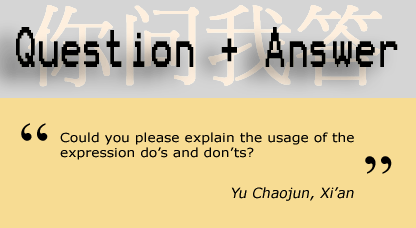|

|
Listen to this programme first and then read the content below. 请先听节目然后再阅读以下内容。
This week’s question comes from Yu Chaojun in Xi’an who wants to know more about the expression do’s and don’ts.
Callum from BBC Learning English explains to us that do’s and don’ts are basically things you should do and shouldn’t do.
|

|
|
| A sign saying what you shouldn't do |
So for example, at your place you work, some do’s and don’ts might be:
Do call your manager if you are going to be late.
Don’t leave your computer switched on at work.
It is merely another way of listing rules, often using ‘do’ in the imperative form. Imperatives are verbs used to give orders or instructions.
You might hear people talk about the do’s and don’ts of doing a particular thing.
"Here are some do’s and don’ts at the swimming pool – don’t run, do wear a swimming cap."
"Safe cycling: do’s and don’ts – you should always wear bright clothes, you must never cycle through a red light."

|
|
| Some do's and don'ts |
Do’s and don’t are sometimes seen on signs or notices to help you, but more often than not you will hear the expression do’s and don’ts in conversation and people talking about what you should and shouldn’t do in different situations.
Take note of how it’s written too – make sure you put the apostrophes in the right places.
Thanks for your question Chaojun. We hope the answer helped you.
If you have a question about the English language, DO send us an email: questions.chinaelt@bbc.co.uk and DON’T forget to visit this page regularly to learn more about English!
Glossary 词汇
switched on 开启
listing 列举
imperative form 祈使形式
orders 指令
instructions 指令、指示
signs 指示牌
notices 布告
take note 记笔记
make sure 确保
apostrophes 撇号

 本周问题与答案
本周问题与答案


